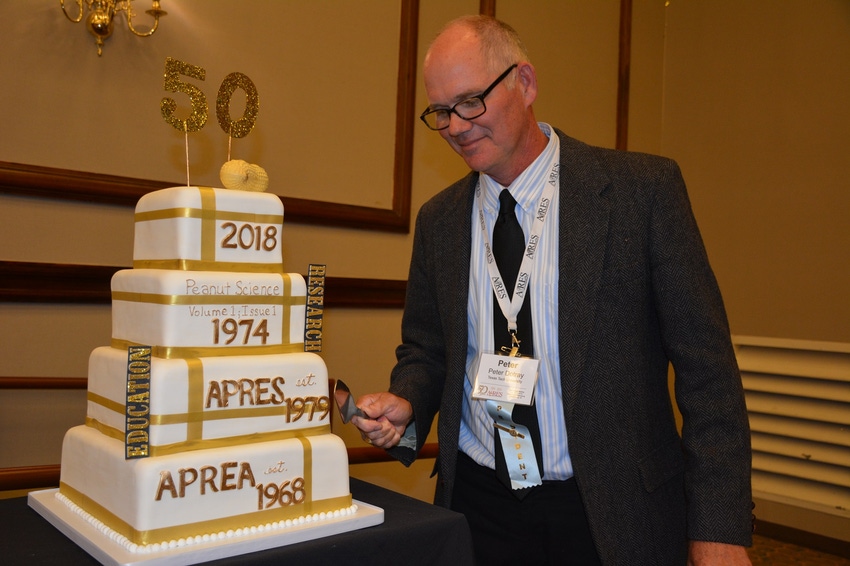
Dr. Peter Dotray walked to the podium to perform his last duties as president of the American Peanut Research and Education Society (APRES). He thumped the microphone to get the audience’s attention. No sound issued from the mike. He thumped again. Still nothing. Once more—zilch.
Dotray then strode to the middle of the stage, looked out over the quiet, expectant congregation, and said in a voice louder than usual something along the lines of, “can you hear me in the back?”
We could.
Dotray used skills honed as professor, research scientist and Extension specialist — addressing crowds in all manner of acoustically challenged venues — to move the meeting along without a hitch. It was an appropriate final curtain for Dotray as he presided over the 50th annual meeting of APRES, held in Williamsburg, Virginia, not far from the spot where the first commercial field of peanuts was grown sometime in the late 1800s.
Dotray, who has joint appointments with Texas A&M AgriLife Research and Extension and Texas Tech, in Lubbock, asked the audience to think back to 1968, the year APRES began (Initially the American Peanut Research and Education Association, the organization changed from association to society in 1979). In 1968, Dotray said, the Boeing 747 was put into service. Apollo 7 went into space. The first air bag was developed for automobiles, and a doctor in South Africa performed the first successful heart transplant.
Theater screens projected The Graduate and Guess Who’s Coming to Dinner. Customers could buy a Big Mac for 49 cents; the Beatles sang Hey Jude; 60 Minutes premiered on Sunday night television; the controversial play Hair debuted in London.
The times, according to a song of that era, were a’changin.
Dotray recalled that APRES membership peaked in the 80s, boasting more than 800 members. The low point occurred in 2011.
“We are excited that this year attendance has exceeded 400 for the first time in several years,” Dotray said. Official count was 401. The meeting included 140 presentations, including graduate student papers and posters. Delegates also voted to create a graduate student organization.
Business meeting committee reports provided evidence of stability. In 1968, the annual APRES income was $4,392. Expense was $495, with an ending balance of $3,897. In 2017, APRES collected $123,387 in income, spent $108,858 and had a year-end balance of $14,916.
Dotray paid tribute to the executive officers who have served APRES and managed day-to-day affairs, starting with Leland Tripp, executive secretary-treasurer from 1969 through 1974. He was aided by Coyt T. Wilson, who served as administrative assistant from 1969 through 1977. Donald Smith took over for Tripp and served from 1975 through 1983. Broadus Brown served as administrative assistant from 1978 through 1983.
Ron Sholar, who currently leads the Oklahoma Peanut Commission, served as executive officer for 23 years, 1983 through 2007. Dotray applauded Sholar’s long service and countless contributions to APRES and the U.S. peanut industry.
Jim Star succeeded Sholar and served as executive officer from 2007 to 2013. Current Executive Officer Kim Cutchins took over in 2013.
Dotray’s last official duty was announcing award winners (to be addressed in a separate piece) and presenting plaques and a few checks.
Dotray thanked capable committee members “for making my job easy.” He said program chairman Rick Brandenburg, N.C. State University, who replaces Dotray as president, did a lot of the heavy lifting. He also thanked Corley Holbrook, USDA-ARS, Tifton, Georgia, immediate past president, for his guidance.
He also recognized APRES charter member Dr. Charles Simpson, Texas A&M research peanut breeder, Stephenville, Texas, and his wife LynAnne, and asked them to cut the multi-tiered 50th anniversary peanut butter cake.
Before he turned the APRES gavel over to Brandenburg, Dotray took advantage of a recently repaired public address system to express some final thoughts on his year as APRES president.
“It has been an exceptional meeting,” he said. He also noted that when he was first tapped into the APRES officer ascendancy ladder he did not realize that his year as president would coincide with the 50th anniversary. He said a bit of panic came with that realization. No panic was necessary.
He offered a “presidential charge,” in a final address.
“I have been a member of APRES since 1997,” he said, “and I am thankful that many of my work relationships and friendships have come from this organization. We are fortunate to do what we do, and we need to resonate this fortune and be passionate in everything we do.”
He said the need to “develop creative, science-based peanut research,” is as critical today as it was 50 years ago. “An equally important critical need is to focus on effective and well-articulated communication about our science. We can’t be afraid to challenge the current way of thinking.
“Get involved,” Dotray challenged the audience. “Say yes when called. APRES needs you as we create the next 50 years of memories.”
He accepted a congratulatory plaque from Brandenburg, and then, as he had suggested in remarks the evening before at the 50th Anniversary Banquet, “happily joined the ranks of past presidents.”
About the Author(s)
You May Also Like






